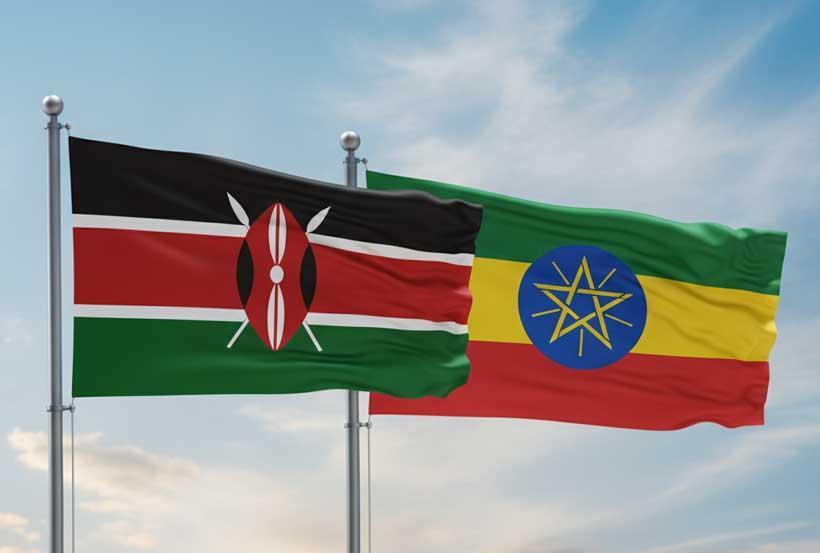By
Alassane Dembele
Africa-Press – Kenya. Over the last two decades, the Horn of Africa has witnessed an increase of foreigntroops in Djibouti, a rise in investments along the Red Sea, and more pronounced engagement in its internal affairs by confirmed and emerging powers all of which showcase the geopolitical appetite for influence in the region. Yet current crises – the war in Sudan, persisting insecurity in Somalia, renewed tensions between Ethiopia and Eritrea, and contentious relations between countries – underscore an uncertain future that could make the volatile region even more prone to external influence. Will local leadership step up to the task of preserving stability through improved regional relations or leave its most pressing issues unresolved?
An analysis by Mvemba Phezo Dizolele, Mwachofi Singo, and Hallelujah Wondimu published earlier this year by the Center for Strategic and International Studies provides key insights on the risk posed by the absence of a clear pillar state(s) to push for peace and security within the region which could worsen its vulnerability to competing middle powers.
The three experts on African geopolitics argue that given its history of conflicts and ongoing tensions, the region demands the rise of Ethiopia and Kenya as stronger leaders able to drive reform initiatives aimed at protecting the interests of the Horn of Africa. As such, the two nations offer strong, suitable and strategic advantages for the region despite facing their own internal and regional challenges which they must also attend to.
The CSIS report view Ethiopia’s role as central to transforming the region towards a stable and self-sufficient neighborhood capable of addressing its own tensions, preserving peace and promoting economic development. Whether Ethiopia intends to assume this role, however, rests on the success of its current transition that began since Prime Minister Abiy Ahmed took power in 2018 following decades of Tigray dominance over the country. Yet the envisioned reinforcement of the federal structure led by a strong central government has had setbacks in the last few years with the occurrence of the violent war in Tigray and ongoing security concerns over autonomy seeking movements.
This suggests that Ethiopia will inevitably have significant nation building to do to preserve the unity of the country hence the recent inward focus to stabilize domestic tensions. The achievement of the Renaissance Dam stands as good symbol of national harmony that could be replicated across other sectors of society to reinforce inclusion and equity. This image of improved and steady stability in Ethiopia is crucial to consolidate its leadership position in the region.
According to the researchers, Ethiopia’s (re)emergence as a leader in the Horn is also closely linked to its capacity to improve its relations with neighbors which have deteriorated the last few years. They cite the territorial dispute with Sudan, the sudden outreach to Somaliland irritating Somalia and Djibouti or one could add renewed animosity with Eritrea. Ironically, these frictions could lead to Ethiopia’s further rapprochement with external emerging actors eager to increase their influence in the region that will further complicate regional cooperation imperative for stability. This signals a pressing need for the country to reset its relations with its neighbors as the current trajectory could end up being an obstacle towards its economic development. Again, the Grand Renaissance Dam which is already a major component of Ethiopia’s trade policy in the region could be the catalyst needed to reinvigorate diplomatic ties.
While Ethiopia remains focused on its introspection and on pursuing a more bilateral approach to regional diplomacy, Kenya could seize the opportunity to accentuate its leadership position and diplomatic consistency. Kenya’s relatively peaceful independence transition and constant display of neutrality when engaging mediation processes forged its image as a credible leader for the region. The report also highlights a long history of proactive foreign policy by successive Kenyan presidents which emphasized economic development through regional trade integration. However, Kenya’s recent actions with regards to the Sudan conflict and the war in the DRC might alter its reputation and ability to conduct peace initiatives in the region while similar moves may instead translate an incoherent foreign strategy.
Nevertheless, it would be hard to imagine Kenya further jeopardize its stabilizing role as the country’s own development ambitions largely rests on its capacity to promote regional stability crucial to economic trade with its neighbors. This underscores the need for Nairobi to remain committed to its traditional diplomatic playbook to support impartial interventions while preserving its leverage and reputation throughout such processes.
In addition, Kenyan legacy could be further undermined by internal challenges in light of the gen z movement which may be a decisive political factor ahead of the 2027 elections. Latest developments in Morrocco or Madagascar could give a glimpse of the consequences of such social efforts in Kenya. Whether or not Kenyan youth are able to shake the government, political leaders should implement policies responding to the youth socioeconomic concerns as prolong unrests could diminish its global influence capacity so dear to the current administration.
In a rapidly shifting world order where middle powers are keen on exerting their own vision in the Horn of Africa, it becomes imperative for local leadership to assert regional autonomy to solve issues. Stability and improved inter-state relations should then discourage governments from seeking external support when pursuing domestic interests.
Kenya and Ethiopia both retain significant assets to affirm their influence in the Horn despite their own challenges. However, their capacity to assume an independent leading position might be more uncertain. The almost complete monopolization of the conflict resolution processes in Sudan or the DRC by the United States and the Gulf States clearly reveals the consequences of weak regional leadership. Kenya and Ethiopia could instead harmonize their regional policies through platforms such as the East African Community and the Intergovernmental Authority on Development. Ultimately, Kenya and Ethiopia’s ability to intensify their strategic partnerships could lay the foundation for regional autonomy and stability.
moderndiplomacy
For More News And Analysis About Kenya Follow Africa-Press






